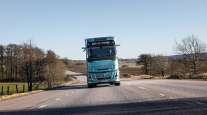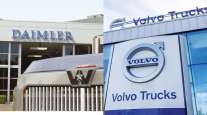Features Editor
Volvo Workshop Prepares Fleet Partners for CARB Regulations

[Stay on top of transportation news: Get TTNews in your inbox.]
Now is the time for fleets to meet the challenge of complying with next year’s regulations from the California Air Resources Board, said Rebecca Schenker, senior director of programs with clean transportation and energy consulting firm Gladstein, Neandross & Associates.
Schenker spoke with a group of dealers and fleets virtually during a Volvo Trucks regulatory education workshop in October to help the manufacturer’s partners navigate the Advanced Clean Trucks and Advanced Clean Fleets rules that will take effect next year.
ACT requires OEMs to sell zero-emission medium- and heavy-duty vehicles starting in 2036. ACF requires fleets to transition to ZEVs as soon as next year.
During her presentation, Schenker noted that most of the questions she gets asked by dealers and fleets about the new regulations are focused on extensions and exemptions. “’How do I get out of this?’” Schenker described. “The bad news is that you don’t, but the good news is there is flexibility built in [the new rule].”
She explained the ACF rule splits California’s fleets into three categories — high-priority and federal fleets, drayage trucks, and state and local government fleets — each of which has its own requirements and pathway to compliance.

A Volvo VNR Electric truck. (Volvo Trucks North America)
Schenker stressed that the high-priority and federal fleets designation represents any entity that owns, operates or directs at least one vehicle in California and has more than $50 million in gross revenue or owns more than 50 vehicles.
She also explained that the rules for compliance include two pathways. One, called Model Year Schedule, is when fleets limit their new vehicle purchases to only ZEVs starting in 2024 while systematically removing older vehicles from operation. Another pathway, called Zero-Emission Milestones, involves fleets meeting yearly conversion targets to ensure an increasing percentage of their operations are ZEVs until they reach 100% by a set date.
Schenker said that the Model Year Schedule is the default pathway and the most straightforward but inflexible. She added that the Zero-Emission Milestones are complicated, but it “allows fleets to continue to add eligible internal combustion engine vehicles to their fleet and remain compliant.”
Schenker warned reluctant partners that they have to reach out to CARB to get access to any flexibility that is needed for such a transition period.

VTNA's introduction to the Advanced Clean Fleet rule, which will take effect in January. (Volvo Trucks North America)
“You need to do the work. Flexibility is only allowed if you are making a good-faith effort to comply with this rule and you just can’t because the technology or infrastructure isn’t available, or your particular use case along one route won’t work,” she said. “You can’t just say, ‘Eh, it’s not doable.’ You have to work with CARB.”
Schenker continued that it is important for fleets to document and provide timelines to work on a proper transition.
Check out Transport Topics' updated Top 50 list of the largest freight transportation companies in the world and explore how these companies are re-evaluating their supply chains. Tune in above or by going to RoadSigns.ttnews.com.
“They’re not going to say, ‘No, you don’t have to do anything,’ but they might say, ‘OK, this is a better and more realistic timeline based on what’s actually happening in the market and in your fleet.’ ”
As for extensions and exemptions, Schenker said that depending on a fleet’s ACF rule category and the compliance pathway selected, there are considerations built into the regulation so that fleets are not penalized for challenges beyond their control.
Also speaking during the workshop, Adam VanderBee, regional sales director at TEC Equipment, said that with the new regulations, the landscape of the industry is shifting.
“With CARB’s emissions-reduction technologies and strategies, we’re certainly going to see business change going forward,” he said. “So I think it’s critically important for us to help you understand these upcoming mandates from CARB.”
Jared Ruiz, regional vice president West for Volvo Trucks North America, finished the workshop by noting that it’s time to get serious about electric vehicles regardless of the realities facing fleets.
Want more news? Listen to today's daily briefing above or go here for more info
“Some of you may not be able to just convert your whole fleet overnight to electric vehicles, and we understand that, but now is the time to really understand what it’s going to take,” he said, adding that it would be wise to take advantage of the purchase opportunities that are available in the local markets this year.
“You’re going to realize that buying diesel engines in 2024 will be more limited and complicated,” Ruiz said. “This is a regulation being implemented across all engine manufacturers in 2024. [It’s] so important to take these into account, start making your plans, make your decisions and start taking action.”





